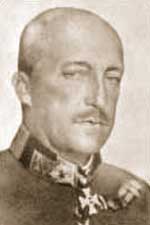|
Josef
Augustin
|
|
|
Østrig,
1872-1962 |
|
|

|
Østrigsk
ærkehertug og general. Gjorde tjeneste som feltkommandør
under Første Verdenskrig og var en af Østrig-Ungarns mere
succesfulde generaler under krigen. Under kampagnen i Galizien som åbnede
krigen i 1914 gjorde Josef tjeneste under 2. armé som kommandør
for en infanteridivision. Som denne kampagne rykkede til Karpatherne blev
han overført til VII korps.
|
|
Moving to the Italian Front in July 1915 Josef's corps saw action in successive
Isonzo battles until, after the Ninth Battle of the Isonzo fought from 1-4 November
1916, he was handed promotion as commander of Austro-Hungarian forces tasked
with the Romanian campaign.
With his professional career determinedly in the ascendant Josef suffered a
grave setback when, in January 1918, he came out as the sole senior commander
to recommend to the Royal Council that separate Austrian and Hungarian armies
be instituted. His influence was greatly diminished following this public stand.
His final senior position of the war brought him command in the Trentino sector,
replacing former Chief of Staff Conrad. The failure of the Piave River offensive
convinced Josef that defeat was imminent and consequently he recommended an
immediate peace.
Josef was appointed Field Marshal on 24 October 1918, while the Italian Army
was successfully storming his lines at Vittorio Veneto.
With war over Josef led a royalist counter-revolution aimed at overthrowing
Bela Kun's communist regime in Budapest. For a brief period he was himself regent
but was rapidly replaced by Admiral Horthy in September 1919 upon the insistence
of the Allies.
He thereafter took up a position as a Hungarian parliamentarian, eventually
ascending to the Upper Chamber where he became a vocal supporter for the notorious
Arrow Cross fascist movement.
With the Red Army's entrance into Budapest Josef fled to Austria. He died on
6 July 1962 at the age of 89.
